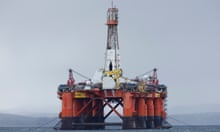The world’s demand for oil, gas and coal will begin to decline this decade in “the beginning of the end” of the fossil fuel era, according to the global energy watchdog.
The International Energy Agency (IEA) has projected for the first time that fossil fuel consumption will peak before 2030 and fall into permanent decline as climate policies take effect.
However, the forecast downturn is still “nowhere near steep enough” to put the world on a path to limiting temperature rises to 1.5C above pre-industrialised levels, which is considered crucial to avoiding a climate catastrophe.
The IEA’s influential energy outlook report, due to be published next month, will show that oil, gas and coal are on course to hit a peak this decade under existing climate policies, earlier than many have anticipated.
Fatih Birol, the IEA’s head, wrote in the Financial Times on Tuesday that the projections would show that “the world is on the cusp of a historic turning point”.
“Peaks for the three fossil fuels are a welcome sight, showing that the shift to cleaner and more secure energy systems is speeding up and that efforts to avoid the worst effects of climate change are making headway,” he wrote.
Birol said the sooner-than-expected peak for fossil fuels was primarily driven by “the spectacular growth” of clean energy including solar panels and electric vehicles.
He also pointed to structural shifts in China’s economy – away from energy-intensive heavy industries – and Europe’s hastened transition away from gas after Russia’s invasion of Ukraine.
However, Birol said the projected declines “are nowhere near steep enough to put the world on a path to limiting global warming to 1.5C”.
after newsletter promotion
“That will require significantly stronger and faster policy action by governments,” he added.
Earlier this year, Birol warned large oil producers “to pay careful attention to the gathering pace of change and calibrate their investment decisions” to the forecast decline in demand for fossil fuels.









